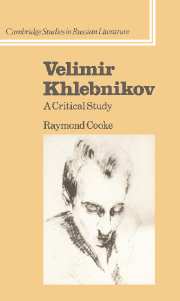1 - Biography, discourse
Published online by Cambridge University Press: 12 September 2009
Summary
Khlebnikov is ‘impossible to read’, the poet Vladimir Mayakovsky wrote in his obituary notice shortly after Khlebnikov's death in June 1922. And he also noted: Khlebnikov is not a ‘poet for consumers’, but a ‘poet for producers’. This much-quoted pronouncement set the seal on a reputation which Khlebnikov acquired in his lifetime and which was to last for many years to come.
Khlebnikov might have expected a more sympathetic appraisal from the fellow Futurist who had some years earlier proclaimed him the ‘king of Russian poetry’ (SP v 333). However, Mayakovsky was doing no more than echoing the opinion of his time. For most of his contemporaries Khlebnikov was in particular the author of the renowned neologistic poem ‘Incantation by Laughter’ (‘Zaklyatiye smekhom’) and in general the author of ‘transrational’ (zaumnyy) verse, and the purveyor of gibberish. It was generally considered, as Mayakovsky wrote in his obituary, that out of every 100 people who read Khlebnikov only 10 would be able to ‘know and love’ him and these would be Futurist poets and formalist philologists. If Mayakovsky is voicing such opinions, then it is little surprise that a less sympathetic obituary writer could refer to Khlebnikov as an ‘eternal failure and half-crazy versifier’.
There was, however, some justification for the unhappy remarks of Mayakovsky and other writers and critics of his time.
- Type
- Chapter
- Information
- Velimir KhlebnikovA Critical Study, pp. 1 - 30Publisher: Cambridge University PressPrint publication year: 1987



